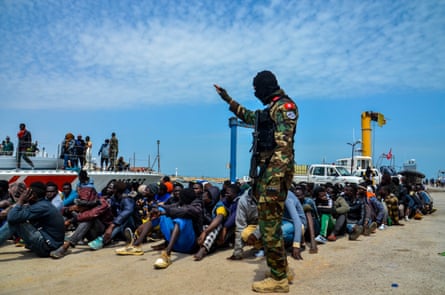The European Commission is fundamentally overhauling how it makes payments to Tunisia after a Guardian investigation exposed myriad abuses by EU-funded security forces, including widespread sexual violence against migrants.
Officials are drawing up “concrete” conditions to ensure that future European payments to Tunis can go ahead only if human rights have not been violated.
The conditions will affect payments worth tens of millions of pounds over the next three years.
Last year, the Guardian detailed allegations that Tunisia’s national guard had raped hundreds of migrants, beaten children and colluded with people smugglers.
Critics will view Europe’s shift in position towards Tunisia as an admission that a controversial Tunisia-EU deal in 2023 prioritised lowering migration to the bloc over human rights.
Until now, the EU has rejected accusations of wrongdoing in its dealings with Tunisia, arguing that it has one of the most sophisticated systems for monitoring human rights violations.
Officials, however, now confirm that new arrangements are being prepared for its relationship with the increasingly authoritarian north African state over “the coming years”.
A commission spokesperson described the reset as a “re-dynamisation” of the relationship, adding that a series of subcommittees would be formed over the next three months to ensure human rights were central to its dealings with the country from now until 2027.
“Human rights and democratic principles are at the centre of EU relations with partner countries,” the spokesperson said.
Emily O’Reilly, the EU ombudsman whose recent report concluded that the commission was not transparent about the human rights information it held on Tunisia, said: “There have been highly worrying reports about the human rights situation in Tunisia.”
O’Reilly said that during a recent inquiry into abuse allegations surrounding the EU’s deal with Tunisia – which included about €100m (£85m) to strengthen its borders as part of a larger deal – she had urged the introduction of conditions to reclaim EU funds in cases of abuse violations.
“I asked the European Commission to set out clear criteria for the suspension of EU funds due to human rights violations,” she said.
Last September’s Guardian report prompted calls by the EU for Tunis to investigate the allegations, though nothing has since been made public. Instead, the commission has taken matters into its own hands to ensure its dealings with Tunisia’s president, Kais Saied, are not linked to abuse.
Reports indicate that Tunisia has become increasingly repressive since Saied secured a second term last October, prompting a crackdown on activists campaigning for migrant rights, as well as on parts of the media.
Human rights groups believe that the EU’s tougher stance towards Saied could precipitate similar measures towards other countries where it has struck deals to reduce migration into Europe.

Concerns have already been raised about human rights assessments on EU deals with Egypt and Mauritania, and over plans to provide more funding to others such as Morocco.
O’Reilly, who leaves her post at the watchdog next month, said: “The apparent normalisation of the outsourcing of migration to non-EU countries must not obscure the fact that the EU institutions’ fundamental rights obligations remain the same.
“These obligations should not be sacrificed for expediency or to meet geopolitical concerns.”
Source: theguardian.com


